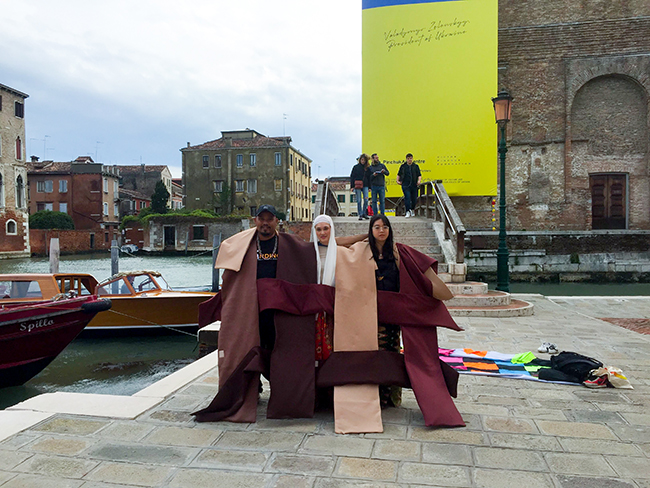Dhan Illiani Yusof is a Southeast Asian multidisciplinary artist in Projek Rabak and the KolmeGlu art collective. With an educational background in fashion design, Dhani’s work spans installation, performance art, fashion design, short films, conceptual photography, and poetry. Her art often incorporates textiles and fabric to explore and highlight socio-political issues. Dhani examines how identity and belief manifest visually, particularly in clothing and fabric, and how these narratives shape internal beliefs and external environments.

Dhani’s work has been exhibited in different countries, including shows at the 59th International Art Exhibition of La Biennale di Venezia (2022), Documenta Fifteen (2022), and the Cairo Biennale (2023). Her art has also been featured in publications such as Reconstructed Magazine, Harper’s Bazaar Arabia, and Spur Magazine Japan. Through her diverse artistic practices, Dhani creates a discourse around identity, community, and the power of visual storytelling.
Dhan Illiani Yusof’s artistic journey is a fascinating blend of fashion, fabric, and conceptual art. Her background in fashion design provides a unique lens through which she views the world, and this perspective permeates her diverse body of work. From installations and performance art to short films and photography, Dhani uses various mediums to explore complex socio-political themes.
One of Dhani’s pieces, “We The Mengkuang” (We the Pandanus), was performed at the 59th Venice Biennale in 2022. This interactive performance piece highlights the cultural significance of weaving in Malaysian society. In “We The Mengkuang,” Dhani invites participants to become part of the weaving process, symbolically transforming them into Mengkuang leaves. This act of collective weaving reflects the interconnectedness and community spirit inherent in Malaysian culture. It underscores the idea that, despite our differences, we are all woven together by shared values and experiences.
Textiles and fabric are central to Dhani’s work, serving as powerful metaphors for identity and belief. Through her art, Dhani examines how clothing and fabric can reflect and shape our understanding of who we are and how we relate to the world around us. Her use of textiles is not just about the material itself but also about the cultural and social contexts in which these materials exist.
In her installations and performances, Dhani often uses fabric to create immersive environments that invite viewers to engage with the artwork on a personal level. These spaces become sites of exploration and reflection, where participants can contemplate their own identities and beliefs in relation to the broader socio-political landscape. By weaving together personal and collective narratives, Dhani’s work encourages a deeper understanding of the complexities of identity and community.
A recurring theme in Dhani’s work is the creation of shared spaces where people can come together to explore and celebrate their identities. This emphasis on community and collaboration is evident in pieces like “We The Mengkuang,” where the act of weaving becomes a metaphor for the interconnectedness of our lives. By engaging participants in the artistic process, Dhani fosters a sense of unity and collective experience.
Through her art, Dhani challenges us to think about how we relate to one another and to the world around us. She encourages us to see beyond our differences and to recognize the common threads that bind us together. In doing so, Dhani’s work serves as a powerful reminder of the importance of community and the strength that comes from working together.
Dhan Illiani Yusof’s multidisciplinary approach to art allows her to explore complex themes of identity, community, and belief in innovative and thought-provoking ways. Her use of textiles and fabric as central elements of her work creates a rich and layered narrative that invites viewers to engage with her art on a deeply personal level.
Her work not only highlights the cultural significance of traditional practices like weaving but also encourages us to reflect on our own identities and the ways in which we are connected to those around us.

